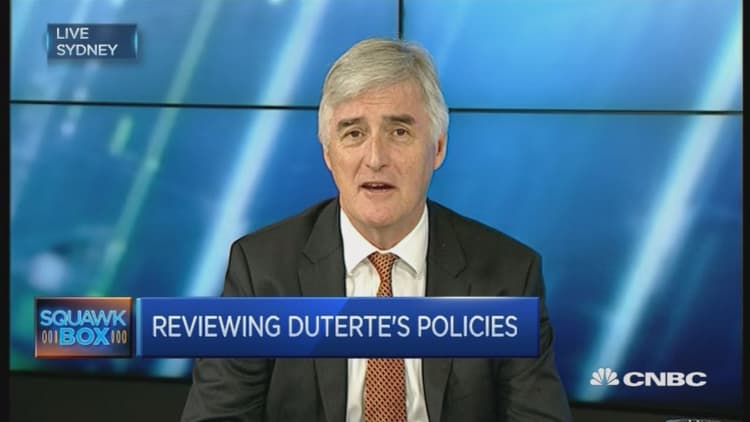The demotion of a high-profile Philippine politician for critiquing President Rodrigo Duterte has raised worries over the country's commitment to democracy as the war on drugs intensifies.
On Monday, the Senate removed Leila de Lima, a former Justice Secretary, from her post as head of a committee investigating the President's extrajudicial killings. Outspoken de Lima is the leading opponent within the government of Duterte, also known as "The Punisher", frequently condemning him of using the nation-wide narcotics crackdown as an excuse to commit murder with impunity.
Over 3,000 have been killed in the 11 weeks since Duterte came to power. One of the highest profile victims so far was Maria Aurora Moynihan, daughter of notorious British baron Antony Moynihan, who was found shot dead on the streets of Quezon City two weeks ago, with a sign reading 'drug pushers to celebrities, you're next.'
The Senate justified Monday's move by saying de Lima was using the committee as a vehicle for "personal political vendettas," but political strategists widely believe the President was involved as a result of events last week.
In a Senate investigation led by de Lima last Thursday, hitman Edgar Matobato testified that Duterte personally gave orders to assassinate criminals, such as drug dealers and rapists, as Davao City mayor in the 1990s. Matobato also claimed Duterte himself killed a government agent and alleged that the President's eldest son and Davao's current vice mayor Paolo Duterte was a drug user. Duterte responded by accusing Matobato of lying under oath.
"This was obviously very explosive testimony, so Duterte's allies moved quickly to remove her (de Lima) as head of the Senate judiciary committee," explained Mark Thompson, director of the Southeast Asia Research Centre at City University of Hong Kong.
De lima was not even a real threat to Duterte, noted Bob Herrera-Lim, Southeast Asia managing director at political advisory firm Teneo Intelligence.
The government has enough seats in both the Senate and House of Representatives (the two bodies that make up Congress) so its programs are unlikely to be upset, he explained. "He (the President) very likely saw that removing de Lima was politically expedient."
Duterte has so far rejected the claims, stating that he doesn't intervene with other government branches, according to local news.
But it's no secret that the 71-year old is sensitive to criticism.
During a speech on Tuesday, he lashed out against the European Union (EU) by saying "f--k you" and performing the one-finger gesture after the bloc condemned the extrajudicial killings. Recent weeks have also seen the President curse U.S. President Obama and the United Nations.
Duterte also launched an aggressive smear campaign against de Lima before her demotion on Monday, accusing her of sexual escapades, links to drug lords and bribery, local media reported. On Tuesday, several witnesses including a convicted felon and former prison officials told Congress that they had regularly bribed de Lima, who denied the allegations.
More political suppression to come
Despite mounting pressure from the international community—Human Rights Watch called de Lima's ousting a "craven attempt to derail accountability for the appalling death toll from the abusive war on drugs"—Duterte is likely to continue silencing the opposition, analysts said.
"He has a hyper majority in Congress and will continue to use this to limit criticism... It is possible Duterte may make moves toward creating a more authoritarian regime in the near future," said Thompson.
A day after Matobato took the witness stand, Duterte announced a list of about 1,000 "narco-politicans" and government officials, including mayors, governors and judges, with suspected drug links.
"This new list will simply justify his argument that he needs an extension for his anti-drug campaign. His vow to crush illegal drugs and criminality within first six months of his presidency might be extended for another several months," said Phidel Vineles, a senior analyst at the Center for Multilateralism Studies, Nanyang Technological University.
Another alarming factor is the total lack of transparency in his campaign, including the source of these allegations, Vineles added. "Due process and the rule of law must be upheld for Duterte's anti-drug campaign so that the country's institutions will not be enfeebled."

Consequences
De Lima's demotion signals the government's limited tolerance for dissent, a worrisome sign for one of Asia's oldest democracies and one with heavy implications for politics and the economy.
"The more the president goes after his critics, the more political polarization it will generate," said Herrera-Lim.
Duterte had a 91 percent approval rating, according to a July 20 poll, but certain segments of the population, such as the middle and upper income classes, as well as non-government institutions including the church, have voiced their unease with his policies.
"If he becomes more aggressive in attempting to remove any criticism of his administration, then they may start to find ways to organize to resist him, which could then push him into becoming less tolerant and then you get a spiral towards polarization," explained Herrera-Lim.
For now though, it may still be too early to call the Philippines undemocratic.
"Congressional majorities are used in many countries to limit the impact of opposition voices in the legislature.... It is dirty politics but not necessarily undemocratic. The press also remains free," noted Thompson.
Jean Franco, assistant professor at the University of the Philippines, shared that view.
It's not unusual for leaders to involve themselves in intra-Senate affairs so Monday's action does not make the Philippines undemocratic, she explained. If opposition continues to dwindle in Congress, that will add pressure on institutions outside the political realm, such as civil society and the media, to ensure accountability, she continued.
Still, experts agree the government's stance is likely to weigh on the long-term perceptions of foreign investors.
On Wednesday, S&P Global Ratings maintained its stable outlook on the country's sovereign credit ratings but warned extrajudicial killings could undermine respect for the rule of law through the challenges presented to the legitimacy of the judiciary, media, and other democratic institutions.

